Wyclef Jean: Eyewitness to Haiti
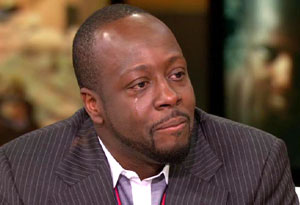
Music mogul and Grammy-winning artist Wyclef Jean is one of the most recognized faces in Haiti. Born outside Port-Au-Prince, Wyclef was 9 years old when he and his family left their village for the United States. Though he achieved his dream of making it big in music, Wyclef's passion and determination remained with his roots. In 2005, he founded a charity to raise awareness for the country and establish education, health, environmental and community programs in Haiti.
On January 12, 2010, a massive earthquake devastated Wyclef's beloved nation. Just a two-hour flight from Florida, Haiti is the only country to have ever gained independence through a slave rebellion. Centuries of civil war, violence, famine, political corruption and countless natural disasters have wreaked havoc on Haiti, but the country had been on the path to progress.
A look at Haiti's resilient history
After the earthquake, Wyclef went back home with his wife and cousin. What he saw, he says, can only be described by one word: "Apocalypse."
"The best way I can explain it is for you to walk into a city, and the entire city feels like walking into a morgue. Every two blocks, 15 to 16 bodies on the floor," he says. "People running through the city holding their babies in their hands while the baby is dead."
On January 12, 2010, a massive earthquake devastated Wyclef's beloved nation. Just a two-hour flight from Florida, Haiti is the only country to have ever gained independence through a slave rebellion. Centuries of civil war, violence, famine, political corruption and countless natural disasters have wreaked havoc on Haiti, but the country had been on the path to progress.
A look at Haiti's resilient history
After the earthquake, Wyclef went back home with his wife and cousin. What he saw, he says, can only be described by one word: "Apocalypse."
"The best way I can explain it is for you to walk into a city, and the entire city feels like walking into a morgue. Every two blocks, 15 to 16 bodies on the floor," he says. "People running through the city holding their babies in their hands while the baby is dead."
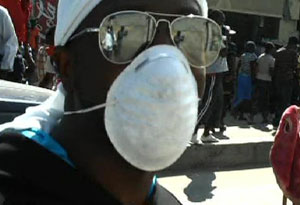
The destruction in Haiti left countless people homeless, including the prime minister and his wife, who were forced to live in the airport. "[The prime minister's wife said], 'Clef, y'all really got to be strong because once you leave this airport, you're not going to believe what you're going to see."
While in Haiti, Wyclef and his family shot their own home video of the devastation they encountered. "Bone-chilling screams," he says. "It's the first sound my wife, Claudinette, and I hear."
Watch Wyclef's video.
Wyclef says people lay dead in the streets everywhere they went. They wore masks to try to block the smell of decomposing bodies. "That's something they don't cover in the news," he says. "The smell of the bodies."
Because cemeteries are overflowing, Wyclef says survivors have begun to dig shallow graves. "Most of these people laid to rest here will never be identified," he says.
While in Haiti, Wyclef and his family shot their own home video of the devastation they encountered. "Bone-chilling screams," he says. "It's the first sound my wife, Claudinette, and I hear."
Watch Wyclef's video.
Wyclef says people lay dead in the streets everywhere they went. They wore masks to try to block the smell of decomposing bodies. "That's something they don't cover in the news," he says. "The smell of the bodies."
Because cemeteries are overflowing, Wyclef says survivors have begun to dig shallow graves. "Most of these people laid to rest here will never be identified," he says.
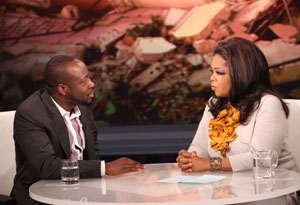
Wyclef and his team also worked to free people—living and dead—from the rubble. After they rescued a 14-year-old girl who survived the collapse of her home, she was rushed to the hospital, only to find it had been destroyed.
Wyclef, who's lost many friends and family in this tragedy, also helped recover the body of a good friend. The man was stopped at an intersection when a building collapsed on top of his car. "It took us two days to get his body out," he says.
In the city of Jacmel, Wyclef's foundation had sponsored a school for young artists. Once a beacon of hope, the school was destroyed in the earthquake. There were no survivors. "The idea of a school collapsing and every kid in the school, including the teachers, just completely wiped out is unheard of," he says.
Wyclef, who's lost many friends and family in this tragedy, also helped recover the body of a good friend. The man was stopped at an intersection when a building collapsed on top of his car. "It took us two days to get his body out," he says.
In the city of Jacmel, Wyclef's foundation had sponsored a school for young artists. Once a beacon of hope, the school was destroyed in the earthquake. There were no survivors. "The idea of a school collapsing and every kid in the school, including the teachers, just completely wiped out is unheard of," he says.
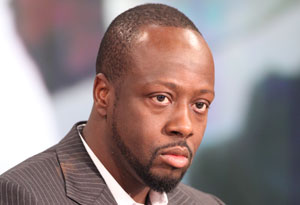
From rescue missions to medical care to the distribution of food and supplies, Wyclef says the logistics have been a major challenge in the aftermath of the earthquake. "It's not like Haiti didn't have the tractors. The people that we were looking for that usually drive the tractors, they're under rubble. So that was a lot of the problem."
Wyclef also wants to emphasize that the earthquake has affected all of Haiti, not just Port-au-Prince, where many relief efforts have been focused. "Sometimes when people hear Port-au-Prince, they assume that's the entire Haiti," he says.
Still, despite all the challenges Haiti now faces, Wyclef says he was buoyed by a sense of hope. "I remember every night ... the people were singing. Despite what they were going through, you still heard 'Amazing Grace,'" he says. "The thing about the Haitian people is it's will. It's determination."
Wyclef also wants to emphasize that the earthquake has affected all of Haiti, not just Port-au-Prince, where many relief efforts have been focused. "Sometimes when people hear Port-au-Prince, they assume that's the entire Haiti," he says.
Still, despite all the challenges Haiti now faces, Wyclef says he was buoyed by a sense of hope. "I remember every night ... the people were singing. Despite what they were going through, you still heard 'Amazing Grace,'" he says. "The thing about the Haitian people is it's will. It's determination."
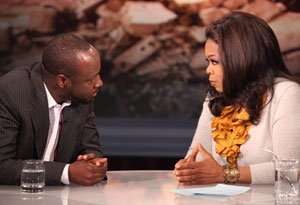
In the days after the earthquake, Wyclef has defended his charity, Yele Haiti, against accusations that he has personally profited from the foundation. It was also found that the organization had not paid taxes every year.
Wyclef says his organization was put under more scrutiny in the days following the earthquake. "The attack on me, it basically came because once we started our movement, no one was focused on Yele until they noticed that we [were] raising $1 million dollars a day after the earthquake," he says. "What that did was it rose a lot of eyebrows."
Wyclef admits mistakes were made. "I think definitely when you're starting a business, it's important to have the right people around you. When you're starting a foundation, it's even more important," he says. "I think that it was poorly ran, and I think that we have learned from our mistakes."
Wyclef strongly denies using any money raised by Yele Haiti for personal means. "I have never in any form taken payment for myself," he says. "As a matter of fact, when I was starting my charity, I put my first million dollars in."
Despite the recent setbacks, Wyclef sees a bright future for Yele Haiti. "Moving forward, I think we're going to be stronger than ever," he says.
Find out how you can help Haiti
Dr. Sanjay Gupta reports from Haiti
Wyclef says his organization was put under more scrutiny in the days following the earthquake. "The attack on me, it basically came because once we started our movement, no one was focused on Yele until they noticed that we [were] raising $1 million dollars a day after the earthquake," he says. "What that did was it rose a lot of eyebrows."
Wyclef admits mistakes were made. "I think definitely when you're starting a business, it's important to have the right people around you. When you're starting a foundation, it's even more important," he says. "I think that it was poorly ran, and I think that we have learned from our mistakes."
Wyclef strongly denies using any money raised by Yele Haiti for personal means. "I have never in any form taken payment for myself," he says. "As a matter of fact, when I was starting my charity, I put my first million dollars in."
Despite the recent setbacks, Wyclef sees a bright future for Yele Haiti. "Moving forward, I think we're going to be stronger than ever," he says.
Find out how you can help Haiti
Dr. Sanjay Gupta reports from Haiti



